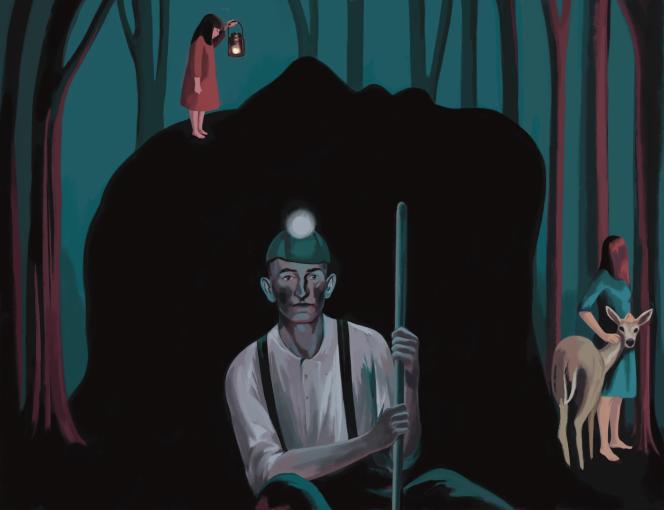The first time I heard a text by Penda Diouf was at the Festival d’Avignon in 2017, she was doing a scenic reading of Pistes, a beautiful monologue in which her admiration for the Namibian athlete Frankie Fredericks, vice- Olympic champion in the 100 meters and 200 meters in 1992 and 1996, allowed him to approach the history of oppression through a reflection on the body of the athlete and that of the slave.
French born in 1981, in Dijon, of a Senegalese father and an Ivorian mother, naturalized Senegalese for a few years, she writes plays which all testify to a political will and question identity, injustice, transmission , without just defending a cause. Its commitment also involves a militant demand for diversity in live performance. She who, at the age of 19, wrote Dust, her first play, without ever having gone to the theater, was very impressed by a performance of The Cherry Orchard, by Chekhov (1904), whose director, the Haitian writer Jean-René Lemoine, had chosen to play only black actors. Director of a library in Saint-Denis (Seine-Saint-Denis), she founded (with Anthony Thibault) the Young Texts in Freedom label, which promotes new playwrights. Because words, rhythms, images remain primary: the deep desire to act on reality does not exclude creative power, and she willingly quotes Edouard Glissant: “We won’t change the world if we don’t transform imaginations . »
Noire comme l’or, his new play, depicts a family of miners in the Pas-de-Calais, between 1948 and 1984, – the black gold evoked by the title is then coal and not oil. Saïd Amraoui arrived from Morocco, like so many other immigrants, to extract the ore at the risk of his life. His companion, Barbara, whose parents came from Poland in 1924, is a sorter in the same mine, they met at the ball. The chorus of the mine, a recurring character, recalls the deadly working conditions: “If France gets warm it’s thanks to us / The poor underground vermin / Who wear themselves out from the lungs to the knees / So that the nation remains sovereign. “Following a revolt of the miners – the fact is historic – “strikes broke out. The State sends the armored vehicles, the tanks. The striking foreign miners are simply expelled. Said is one of them.” Barbara is left alone with their daughter Hajar, whom she soon leaves to live as a hermit in the wild forest.
The text, subdivided into four element chapters – “Earth”, “Air”, “Fire!” “, “Water” – experiences all the materiality of the real through the vicissitudes of time. The exhausting work first: “The earth is swallowing us up and we are no longer men. We are coal among coal. Earth among the earth. Of the fossil to come in an already fossilized world. The war, then, its soldiers also sacrificed to the fierce “nation”: “They are just waiting for the starting signal, like rats, to rush with rage in their stomachs and fear in their pants on the enemy line. To kill another so as not to die oneself. »
Written for three actresses, an actor and a musician, the play alternates raw evocations and stories that are more magical realism, storytelling, even myth. Thus the postwoman is called Iris, like the messenger of the gods among the Greeks. Similarly Barbara, who lives “on the borders between men and the savage”, always followed by a deer, recalls the goddess Artemis, with eyes “the color of cloudy skies, the color of the wrath of the Gods, full of mist”. She saved the miner Jean Guidet from certain death, who has since become a famous painter. This sometimes takes charge of the story, which is divided very freely between narrative monologues in various tones, realistic or fantasized dialogues, past or present, intimate or collective, song lyrics or newspaper articles. All of them, human or archival, are counted as “characters”, there is also “the chorus of worry” and “the Black Panthers”.
This freedom may seem a bit of a catch-all – let’s say that we may feel there too much the desire of the playwright to affirm her independence vis-à-vis the codes. But transforming imaginations is at this price, and we also perceive how much a staging will do wonders when it is attentive to this diversity – in every sense of the word.
Black as gold is a dark room that goes towards the light. She hammers past tragedies, puts them into perspective over time: “I don’t forget that it was a socialist government that sent my father home when he exercised his right to strike,” says Hajar, her daughter, who never saw him again. Transmission is, however, the thread of hope. “It’s happy, it’s precious even, to find your place in the world. To feel that we are welcomed, that we were perhaps even expected. And that the thread of his life has unfolded to this day, to live this second and those that follow. All my life, that of my parents and elders just so that I can live this moment. And then I feel filled with gratitude. We too, towards the theater through which everything comes to life.
Read an excerpt on the site of Quartett editions.

















